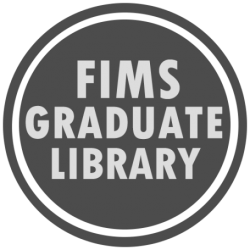Equity, Diversity, Inclusion, and Decolonizing Initiatives
Statement of Acknowledgements and Commitments
Since its inception in 1996, the FIMS Graduate Library has been committed to serving faculty members students, and researchers in line with FIMS’s mission of advancing knowledge about media, communications, and information technologies. FIMS and the FIMS Graduate Library are located on the traditional lands of the Anishinaabek, Haudenosaunee, Lūnaapéewak, and Chonnonton Nations, on lands connected with the London Township and Sombra Treaties of 1796 and the Dish with One Spoon Covenant Wampum. We respect the longstanding relationships that Indigenous Peoples (First Nations, Métis and Inuit) have with this land, and we acknowledge the historical and ongoing injustices of colonization in Canada. We commit to building respectful relationships with Indigenous communities on campus and beyond through our teaching, research, and community service.
We acknowledge the historical role of academic libraries and universities as colonial structures that contribute to inequities in libraries and higher education. As part of Western University, the FIMS Graduate Library is committed to the development of diversity, equity, and inclusion for library users and in library spaces. As a part of FIMS, we are engaged in a long-term process to address historical inequities and injustices to create a welcoming community for everyone.
Learn more about EDID at FIMS
At the library, we are focused on improvements in collection development, knowledge organization, and the accessibility of our space and resources. We welcome feedback on our progress and suggestions for improvement.
Collection Development
At the FIMS Graduate Library, we collect contested books and books of diverse authorship. We are continually expanding our holdings in journalism, media, health information science, and library and information science with a focus on amplifying underrepresented perspectives within these fields. Beyond the scope of materials that are topically relevant to the programs at FIMS, we collect Indigenous-authored literature and banned books.
Smoke Signals Radio Archive Project
The FIMS Graduate Library led an effort to archive and in turn pay tribute to the work of Dan and Mary Lou Smoke as activists, journalists, and teachers at Western University and in the broader community. Together, Dan and Mary Lou have worked tirelessly to advance Indigenous rights, encourage healing, and build cross-cultural understanding in southwestern Ontario and across Canada. In the early 90s, they embarked on what would become one of their most enduring and impactful projects when they launched Smoke Signals, a First Nations radio program on CHRW, Western University’s campus radio station. Smoke Signals is still on the air today and has been recognized by the National Community and Campus Radio Association as Canada’s longest-running Indigenous campus radio program. In collaboration with Dan and Mary Lou, we provide public access to some of the historical audio recordings of the Smoke Signals radio program.
Learn more about the Smoke Signals Radio Archive Project
Knowledge Organization
We use Library of Congress Classification and Subject Headings to organize much of our collection. These schemes of knowledge organization and information retrieval have been criticized for their categorizations of equity-deserving groups (Ewing, 2024; Farnel et al., 2018; Pettitt & Elzi, 2023). We recognize that the tools we use to describe our materials may introduce structures and language that reflect and perpetuate the biases, norms, and perspectives of the time they were created and the people who created them; We stand with Western Libraries in their commitment to continually improve shared resource descriptions in Omni. In support of larger, Indigenous-led initiatives towards respectful terminology, the FIMS Graduate Library is a member of NIKLA-ANCLA (National Indigenous Knowledge & Language Alliance).
Learn more about Western Libraries actions towards more inclusive metadata
Accessibility
In line with The University of Western Ontario and the Faculty of Information and Media Studies (FIMS), the library recognizes the dignity and independence of all staff, students, faculty, and visitors and seeks to ensure that persons with disabilities have genuine, open and unhindered access to our collections, services, and space. As accessibility needs are unique for each person, we work with people to develop a strategy that best supports their needs. We work with students, faculty, or staff to provide access to materials in an alternate format. Our physical space includes accessible seating and supplies and supports accessible printing. We are improving the accessibility of our website.
If you require accommodations, we are happy to assist. Please contact fimslib@uwo.ca.
References
Ewing, M. (2024). Representing Historically Marginalized Communities in Archives: Moving Beyond LCSH to Create More Inclusive Subject Headings. The Information Warrior Journal, 1(1), Article 11. https://doi.org/10.22237/tiwj/1693353780
Farnel, S., Koufogiannakis, D., Laroque, S., Bigelow, I., Carr-Wiggin, A., Feisst, D., & Lar-Son, K. (2018). Rethinking representation: Indigenous peoples and contexts at the University of Alberta libraries. The International Journal of Information, Diversity, & Inclusion, 2(3), 9- 25.
Pettitt, K. & Elzi. E. (2023). Unsettling the Library Catalog: A Case Study in Reducing the Presence of “Indians of North America” and Similar Subject Headings. Library Resources & Technical Services, 67(2), 44–52. https://doi.org/10.5860/lrts.67n2.4
